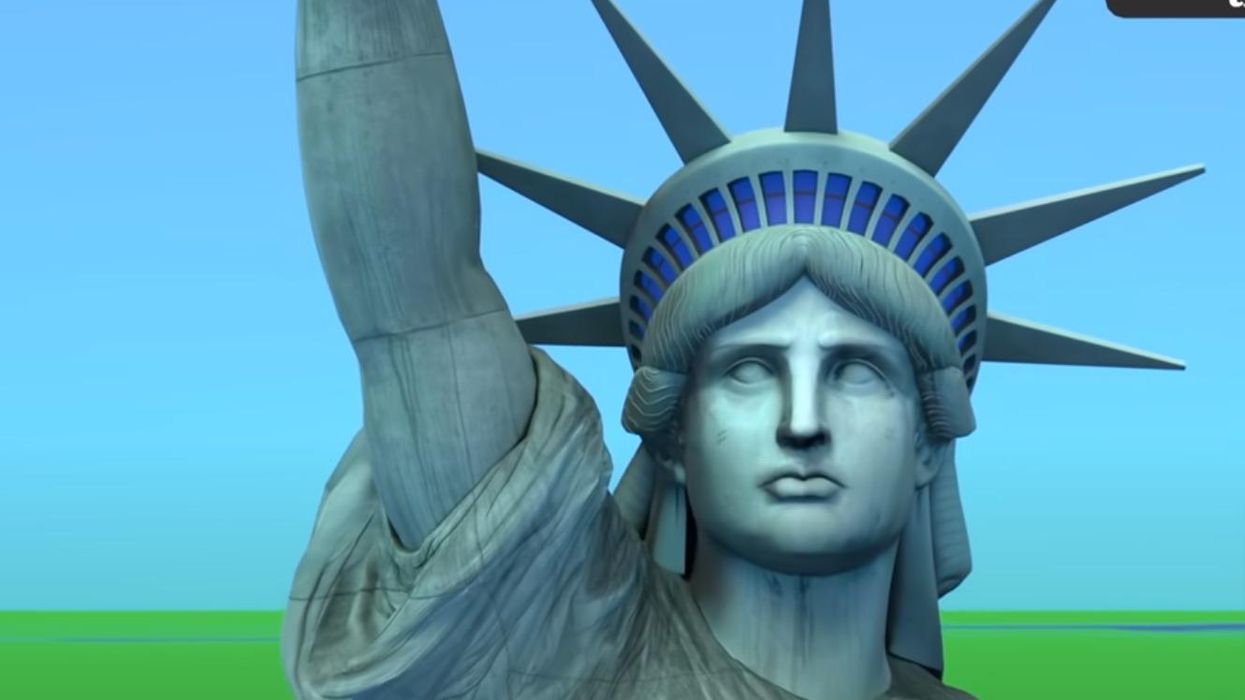
Statue of Liberty
Five million Ukrainians have fled their homeland since Russia invaded, seeking refuge not only in neighboring countries such as Poland and Germany but also in Britain, Canada and the United States. And who can blame them? The Biden administration has admitted more than 100,000 refugees from Ukraine without provoking a whisper of protest in this country.
It's hard for any of us to fault innocent people who are trying to escape the horrors and hardships of war or the brutal consequences of Russian occupation. They and their children have only one life to live, and they are not eager to put that life at undue risk or endure it in misery.
But Americans have a different attitude toward a group that is not so different: the migrants from Mexico, Central America and South America who have made arduous, dangerous journeys to our southern border in hopes of finding a place here.
A majority of Americans regard the stream of new arrivals as an "invasion" — a word normally reserved for military campaigns. Instead of equating these migrants with Ukrainian refugees, they somehow equate them with the Russian army.
But there is no evidence that those showing up at the border asking for asylum harbor hostile intent. Just the opposite: They come here because they think the U.S. offers a better life than what they had back home. They don't want to harm us. They want to join us.
Small wonder. The three countries of Central America's "Northern Triangle" have some of the highest murder rates in the world. They are among the poorest nations in the Western Hemisphere. Plagued with corrupt governments, their citizens have no reason to expect their lives to improve.
So they look elsewhere, and they settle on the U.S. That is the highest of compliments, something we used to understand. During the Cold War, we offered sanctuary to those fleeing Communist oppression in Eastern Europe. We took in hundreds of thousands of Jews who suffered discrimination in the Soviet Union.
In 1965, President Lyndon Johnson proclaimed "to the people of Cuba that those who seek refuge here in America will find it." After the Vietnam War, the U.S. welcomed more than a million people from Southeast Asia.
In his final address as president, Ronald Reagan paid tribute to this tradition. America, he declared, is "still a beacon, still a magnet for all who must have freedom, for all the pilgrims from all the lost places who are hurtling through the darkness, toward home."
Back home, these migrants face terrifying violence and intractable poverty. They want something better. Many have walked hundreds of miles or climbed atop freight trains, risking rape and robbery at the hands of criminal gangs, for the mere chance of gaining entry to the U.S.
They're not the only foreigners who, given the choice, choose America. Since the Chinese government liberalized its emigration policies in the 1980s, the number of Chinese living here has risen nearly sevenfold. The Indian immigrant population has grown even faster.
Our universities have more than a million foreign students. According to the Consumer Technology Association, which represents tech firms, 45% of Fortune 500 corporations, including Apple and Amazon, were founded by immigrants and children of immigrants.
The next Steve Jobs may not be waiting in Mexico right now for an asylum hearing. But Latin American immigrants bring their own talents, as well as the drive to make the most of them. They come here without valid visas only because our miserly immigration rules leave them no plausible alternative.
Xenophobes depict a marauding horde. But as Alex Nowrasteh of the libertarian Cato Institute reports, "Illegal immigrants are half as likely to be convicted or incarcerated as native-born Americans are." Overwhelmingly, they want to work for an honest living that exceeds anything they could dream of in their native countries.
It would be an alarming symptom if all these people were avoiding the U.S. in favor of Brazil or Venezuela. Their preference attests to the enduring appeal of the freedom, opportunity and prosperity that this country offers.
Wang Jisi, a professor of international studies at Peking University, scoffs at his government's insistence that America's best days are behind us. "When people stop queuing up for visas in front of the U.S. Consulates," he told The New York Times, "then the U.S. is in decline." For a lot of people around the world, America is still the promised land. And that's not a bad thing.
Reprinted with permission from Creators.








Trump Cabinet Nominee Withdraws Over (Sane) January 6 Comments